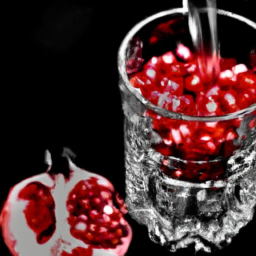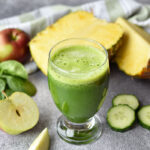Have you ever considered the timeframe for when pineapple juice begins to take effect on your body? Drinking pineapple juice is like taking a trip to a tropical paradise; it’s tasty, refreshing, and full of healthy nutrients. However, just like with any food or beverage, it’s important to know when its effects on your body will kick in.
Pineapple juice is not only delicious but also rich in vitamins, minerals, and enzymes that can boost your immune system, aid digestion, and reduce inflammation. However, the timing of its effects on your body can depend on various factors such as your digestive system, metabolism, and the amount of juice you consume.
In this article, we’ll explore how long it takes for the effects of pineapple juice to kick in, how long they last, and other important considerations to keep in mind. So, let’s set sail on this pineapple juice journey and discover its wonders together.
Key Takeaways
- It is recommended to not consume pineapple juice immediately before or after brushing teeth.
- Pineapple juice should be consumed in moderation to avoid consuming too much sugar, which can lead to health problems such as weight gain, tooth decay, and increased risk of diabetes and heart disease.
- Drinking pineapple juice on an empty stomach in the morning can maximize digestion and absorption of nutrients.
- Opt for fresh, organic pineapple juice over canned or bottled juice to avoid added sugars and preservatives.
Nutritional Benefits of Pineapple Juice
If you’re looking for a tasty way to get a boost of vitamin C and manganese, pineapple juice is a great option! Pineapple juice is packed with nutrients that are essential for maintaining a healthy body.
Vitamin C is crucial for healthy skin as it helps to produce collagen, which keeps skin looking young and vibrant. Manganese is important for bone health and helps to maintain healthy blood sugar levels.
In addition to its nutritional benefits, pineapple juice has been shown to boost the immune system. Pineapple contains a variety of antioxidants that help to fight off harmful free radicals in the body. These antioxidants help to protect the body from damage caused by environmental toxins and pollutants.
Drinking pineapple juice regularly can help to boost your immune system and keep you healthy. However, it’s important to note that drinking too much pineapple juice can have potential side effects.
Potential Side Effects
As I continue to explore the potential benefits of pineapple juice, it’s important to also consider the potential side effects.
Two key factors to consider are the high sugar content and acidity of the juice. While the sugar in pineapple juice is natural, it can still lead to spikes in blood sugar levels, especially for those with diabetes.
Additionally, the high acidity of pineapple juice can cause discomfort for those with sensitive stomachs or acid reflux.
High Sugar Content
You may be surprised to know that just one cup of pineapple juice contains around 32 grams of sugar, which is more than the recommended daily intake for women. Consuming high amounts of sugar can have detrimental effects on blood sugar levels, especially for those with diabetes or insulin resistance. It’s important to keep in mind that the recommended serving size for pineapple juice is only half a cup.
Consuming excessive amounts of sugar can lead to a range of health problems, such as weight gain, tooth decay, and an increased risk of diabetes and heart disease. It’s important to moderate your intake of pineapple juice and other sweetened beverages to reduce your risk of these negative health effects.
Moving onto the next subtopic, it’s also worth noting that pineapple juice has a high acidity level, which can also have an impact on your health.
Acidity
Burning in your throat and a sour taste in your mouth may be the result of drinking too much pineapple juice due to its high acidity level. Pineapple juice has a pH level of around 3.5, making it highly acidic. Consuming too much acidic food and drink can cause enamel erosion, which can lead to tooth sensitivity and decay. In addition to this, high acidity levels can cause discomfort in individuals who suffer from acid reflux or heartburn.
To minimize the impact of the acidity in pineapple juice, it’s recommended to consume it in moderation and not immediately before or after brushing your teeth. Drinking water or milk after consuming pineapple juice can help to neutralize the acidity in your mouth. It’s also recommended to wait at least 30 minutes before brushing your teeth after consuming acidic food or drink. By taking these precautions, you can enjoy the health benefits of pineapple juice without compromising the health of your teeth and mouth.
Moving on to the next section about factors affecting absorption, it’s important to consider the impact of food and drink on the absorption of nutrients in our body.
Factors Affecting Absorption
Imagine your stomach as a bustling marketplace, constantly processing and absorbing nutrients from the foods you eat, including the pineapple juice you’ve recently consumed.
When it comes to the factors affecting absorption, there are several things to consider. One factor is the presence of other foods or medications that may interact with the absorption of pineapple juice. For example, certain medications, like antibiotics and antacids, may interfere with the absorption of nutrients in pineapple juice, leading to a delayed onset of effects.
Another factor is the amount of pineapple juice consumed. The more juice you consume, the longer it may take for your body to fully absorb all the nutrients. In addition, the acidity of the juice can also affect absorption. Pineapple juice is naturally acidic, which can lead to a slower absorption rate. However, this acidity can also have benefits, as it can aid in digestion and nutrient absorption overall.
With this in mind, it’s important to consider these factors when consuming pineapple juice and to be aware of any potential interactions with medications.
Now, let’s move on to the next section about the onset of effects.
Onset of Effects
Once you’ve had a sip of pineapple juice, the clock starts ticking on when you’ll begin to feel its effects, much like a ticking time bomb. The onset of these effects can vary depending on several factors, including the absorption rate and metabolism speed of the individual.
To better understand the onset of pineapple juice’s effects, let’s take a look at the following table:
| Factor | Effect on Onset |
|---|---|
| Quantity consumed | Larger quantities may take longer to absorb |
| Empty stomach vs. full stomach | Absorption may be faster on an empty stomach |
| Metabolism speed | Faster metabolism may result in quicker onset |
As you can see, the absorption rate and metabolism speed of an individual play a significant role in the onset of pineapple juice’s effects. While larger quantities of pineapple juice may take longer to absorb, an empty stomach and a faster metabolism may result in a quicker onset. In the next section, we will explore how long these effects typically last.
How Long Effects Last
So, now that we know when we can expect the onset of effects from drinking pineapple juice, let’s dive into the question of how long we can expect those effects to last.
As someone who’s interested in the nutritional benefits of pineapple juice, I’m curious to know how long I can expect those benefits to stick around.
Additionally, it’s important to consider the digestive effects of pineapple juice and how long those effects may last after consumption.
Duration of Nutritional Benefits
You may be surprised to learn that the nutritional benefits of drinking pineapple juice can last for up to 24 hours after consumption. This means that even if you only drink pineapple juice once a day, your body can still reap the rewards of its nutrients throughout the day.
To fully maximize the benefits of drinking pineapple juice, it’s important to consume it at the best time and in the optimal amount. Here are some tips to help you get the most out of drinking pineapple juice:
- Drink pineapple juice on an empty stomach in the morning to maximize digestion and absorption of its nutrients.
- Aim for ½ to 1 cup of pineapple juice per day to avoid consuming too much sugar.
- Choose fresh, organic pineapple juice over canned or bottled juice to avoid added sugars and preservatives.
Next, let’s explore the digestive effects of drinking pineapple juice and how it can improve your overall digestive health.
Digestive Effects
Consuming fresh, organic pineapple juice in moderation can have positive effects on your digestive health. Pineapple contains an enzyme called bromelain that aids in the breakdown of proteins and can help with digestion. However, it is important to note that consuming too much pineapple juice can lead to digestive discomfort and diarrhea.
Possible allergies to pineapple should also be considered before consuming the juice regularly. Some people may experience mild to severe allergic reactions to pineapple, such as hives, swelling, or difficulty breathing. It is recommended to start with a small serving size and monitor any potential allergic reactions. Additionally, it is important to follow recommended serving sizes to avoid overconsumption and negative digestive effects.
Moving forward, it is important to consider dosage recommendations when incorporating pineapple juice into your diet.
Dosage Recommendations
To determine the appropriate dosage of pineapple juice, consult with a healthcare professional who can assess your individual needs and any potential interactions with medications you may be taking. They can provide frequency recommendations and advise on the best time to consume pineapple juice.
For example, consuming pineapple juice on an empty stomach may enhance its digestive benefits. It’s important to note that while pineapple juice can be a healthy addition to your diet, consuming large quantities may lead to digestive discomfort.
It’s best to start with a small serving and gradually increase the amount as tolerated. Additionally, there are alternative pineapple products available, such as frozen or canned pineapple, which may be more convenient or accessible for some individuals.
Alternative Pineapple Products
There are various pineapple products available, such as canned or frozen pineapple, that may be more convenient for some people. Another alternative is pineapple vinegar, which can be used in salad dressings or marinades. Pineapple extract supplements are also available and may provide some of the same health benefits as consuming fresh pineapple.
However, it’s important to note that these alternatives may not provide the same amount of nutrients as fresh pineapple. Canned pineapple may have added sugars and preservatives, while frozen pineapple may have lost some of its nutritional value. Pineapple vinegar and extract supplements may also lack the fiber and enzymes found in fresh pineapple.
Other ways to incorporate pineapple into your diet include adding it to smoothies or using it as a topping for yogurt or oatmeal.
Other Ways to Incorporate Pineapple into Your Diet
I personally love incorporating pineapple into my diet in different ways, and there are many delicious options to choose from.
One of my favorite ways to enjoy pineapple is by adding it to smoothies. Pineapple’s sweetness pairs well with other fruits like banana and mango, and it’s a great way to start your day with a boost of vitamins and fiber.
Another option is to add cubed pineapple to salads, providing a burst of flavor and texture.
Lastly, grilled pineapple is a tasty addition to any meal, whether as a side dish or topping for tacos or burgers.
Smoothies
Sip on a refreshing pineapple smoothie, blended with ice and coconut milk, to cool down on a hot summer day. Pineapple smoothies are not only delicious but also packed with nutrients that can benefit your health.
Here are four smoothie recipes to try:
- Pineapple and banana smoothie: Blend 1 cup of frozen pineapple, 1 ripe banana, 1 cup of coconut milk, and 1 tablespoon of honey until smooth.
- Pineapple and spinach smoothie: Blend 1 cup of frozen pineapple, 1 cup of fresh spinach, 1/2 cup of Greek yogurt, 1/2 cup of almond milk, and 1 teaspoon of ginger until smooth.
- Pineapple and coconut water smoothie: Blend 1 cup of frozen pineapple, 1 cup of coconut water, 1/2 cup of mango, and 1/2 cup of orange juice until smooth.
- Pineapple and ginger smoothie: Blend 1 cup of frozen pineapple, 1/2 inch of fresh ginger, 1/2 cup of almond milk, 1/2 cup of plain yogurt, and 1 tablespoon of honey until smooth.
Incorporating pineapple into your diet through smoothies is an excellent way to enjoy its unique flavor while reaping the health benefits. However, pineapple juice cocktails should be consumed in moderation as they often contain added sugars.
Moving on to the next section, let’s explore how to incorporate pineapple into salads.
Salads
Get ready to enjoy a variety of fresh and delicious salads by incorporating juicy pineapple as a key ingredient. Pineapple adds a tangy and sweet flavor that pairs well with other fruits and vegetables.
Some popular fruit combinations include pineapple with mango, strawberry, and kiwi. In terms of vegetables, pineapple works well with spinach, arugula, and cucumber.
When it comes to dressing options, pineapple pairs well with citrus-based dressings, like orange or lemon vinaigrette. For a creamier option, try a pineapple yogurt dressing or a coconut milk-based dressing. Adding nuts, like almonds or macadamia, can also give your salad an extra crunch.
Grilled pineapple is another way to incorporate this tropical fruit into your meals. It pairs well with savory dishes, like chicken or pork, and can add a sweet and smoky flavor.
But before we dive into grilled pineapple, let’s take a look at how long after drinking pineapple juice it takes for your body to digest it.
Grilled Pineapple
Indulge in the sweet and smoky flavor of grilled pineapple, a perfect addition to savory dishes like chicken or pork. To make the perfect grilled pineapple, start by slicing the pineapple into rings or wedges, then brush them with a pineapple marinade. This marinade can be made by mixing pineapple juice, soy sauce, honey, and chili flakes.
Let the pineapple marinate for at least 30 minutes before grilling. Grilling the pineapple caramelizes the natural sugars and creates a delicious smoky flavor. The result is a juicy and flavorful addition to any meal.
Grilled pineapple can be served as a side dish, on top of a salad, or even as a dessert with a scoop of vanilla ice cream. Try it out and see how it adds a new level of flavor to your dishes!
Moving on to the next section, let’s explore the benefits of pineapple juice for weight loss.
Pineapple Juice and Weight Loss
Losing weight might be a piece of cake if you add pineapple juice to your daily diet. Pineapple juice is rich in enzymes that aid digestion, making it easier for your body to absorb essential nutrients. These enzymes also help to break down fats and proteins, which can speed up your metabolism and promote weight loss.
In addition, pineapple juice is low in calories and high in fiber, making it a great choice for anyone looking to lose weight. One study found that drinking pineapple juice helped to reduce body weight and body fat in overweight adults. The study participants were given 500 ml of pineapple juice every day for 12 weeks, and at the end of the study, they had lost an average of 1.7 kg (3.7 lbs) and 1.6% of their body fat.
Pineapple juice also has other health benefits, such as improving skin health and boosting the immune system. So, if you’re looking to lose weight and improve your overall health, adding pineapple juice to your daily diet might be a great place to start.
Frequently Asked Questions
Can pineapple juice be consumed during pregnancy?
As a pregnant woman, I have learned that pineapple juice can be consumed in moderation due to its numerous health benefits. Pineapple juice is rich in vitamin C, manganese, and bromelain, and can aid in digestion and reduce inflammation.
Does pineapple juice interact with any medications?
As someone who takes medication, it’s important to be aware of potential interactions with pineapple juice. It can enhance the effects of blood thinners like warfarin, increasing the risk of bleeding. Always consult with your healthcare provider before consuming pineapple juice.
Can pineapple juice cause allergic reactions?
Pineapple juice allergies are rare, but possible. Cross reactivity with other fruits may occur in those with birch pollen allergies. Symptoms may include itching, swelling, and difficulty breathing. Seek medical attention if experiencing a severe reaction.
Is it safe to drink pineapple juice on an empty stomach?
I wouldn’t recommend drinking pineapple juice on an empty stomach due to its high acidity. However, when consumed in moderation with food, it can provide numerous benefits such as improved digestion and immune function. Be mindful of potential side effects such as allergic reactions or digestive discomfort.
Can pineapple juice be used as a natural remedy for digestive issues?
As someone interested in natural alternatives for digestive health, pineapple juice can be a helpful addition to your diet. It contains enzymes that aid in digestion and may help alleviate symptoms such as bloating and constipation.
Conclusion
In conclusion, drinking pineapple juice is a great way to incorporate essential vitamins and minerals into your diet. Pineapple juice is not only delicious, but it can also provide various health benefits, including aiding digestion, reducing inflammation, and boosting the immune system.
However, it’s important to be mindful of the potential side effects and not consume too much pineapple juice, as it may lead to digestive issues. As the saying goes, "everything in moderation."
So, if you’re looking to incorporate pineapple juice into your diet, it’s best to start with small doses and gradually increase as your body adjusts. Additionally, consider incorporating other pineapple products or fresh pineapple slices into your diet for added variety and nutritional benefits.
Overall, drinking pineapple juice can be a healthy and enjoyable addition to your daily routine when consumed in moderation.
Ilana has been a vegan for over 10 years. She originally made the switch for health reasons, but soon found herself becoming more and more passionate about the ethical and environmental implications of a vegan lifestyle. Ilana is the author of The Graceful Kitchen, a blog all about veganism. She loves to cook up delicious and nutritious vegan meals, and share her recipes with others who are interested in leading a cruelty-free life. Ilana is also a strong advocate for using whole foods as the foundation of a healthy diet, and believes that going vegan is one of the best ways to achieve this.
















